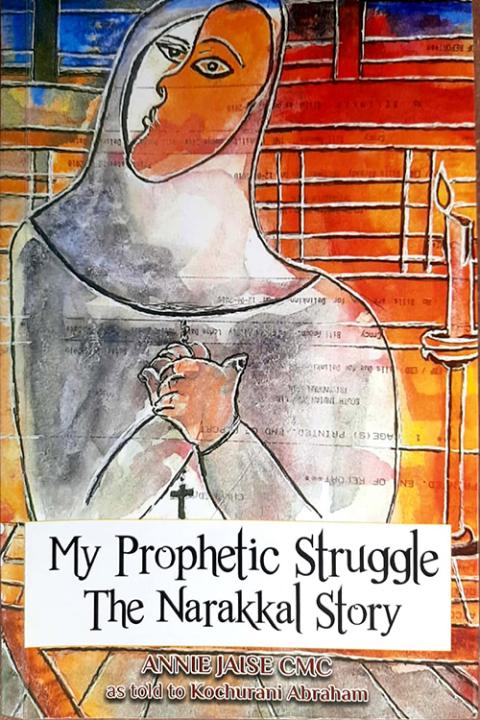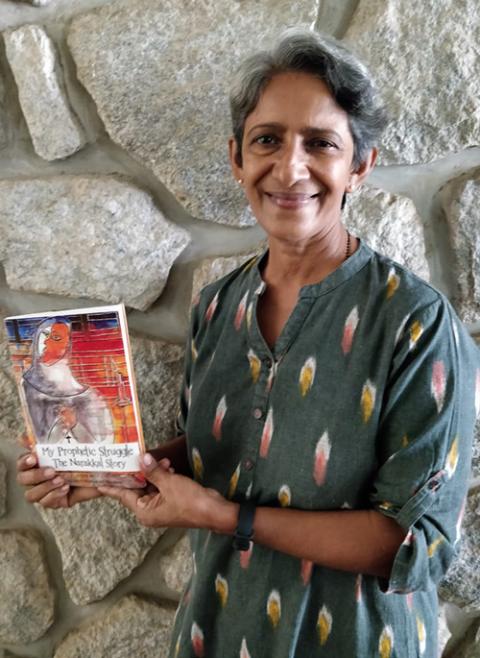
Little Flower Girls High School in Narakkal, a suburb of Kochi in the southwestern Indian state of Kerala, is the center of a dispute between the Congregation of Mother of Carmel nuns and officials of the Archdiocese of Ernakulam-Angamaly. (Saji Thomas)
A book narrating a legal battle by six nuns with an archdiocese over a decades-long property dispute exposes the underbelly of the church hierarchy, say people who have followed the case.
"Like the story of David and Goliath, these simple sisters took on the power and might of the corrupt hierarchy and won," says Sr. Noella de Souza, who was part of a team that carried out an extensive study of property disputes between religious congregations and dioceses in India.
De Souza, a member of the Missionaries of the Child Jesus, was among hundreds who attended the June 26 virtual release of the 199-page book, My Prophetic Struggle: The Narakkal Story.
De Souza says she looks at the battle of the six members of the Congregation of Mother of Carmel with the Archdiocese of Ernakulam-Angamaly as prophetic and inspirational.
The book was published by the Forum of Religious for Justice and Peace, an advocacy group formed by Catholic nuns, brothers and priests, to deal with such disputes in the Indian church.

Sr. Noella de Souza, a member of the Missionaries of the Child Jesus, who studied land disputes between women religious congregations and diocesan authorities in India (Courtesy of Noella de Souza)
It was written jointly by Sr. Annie Jaise, one of the six nuns, and feminist theologian Kochurani Abraham. It narrates how Jaise and others fought to regain the ownership of Little Flower Girls High School from the Narakkal parish in the southwestern Indian state of Kerala.
"The book is not a fiction but a graphic narration of events and incidents that unfolded in our struggle with the diocesan officials and police besides a legal fight starting from the lowest court to the Supreme Court of India," Jaise told Global Sisters Report. "The worst part of our struggle," Jaise recalls, "was when our superior general and provincial, who had initially supported us, sided with our opponents despite knowing the truth."
The congregation came to Narakkal, a suburb of Kochi, the commercial capital of Kerala, in 1926 and opened the Little Flower Convent on a 1-acre plot. A year later, they bought one hectare — about 0.4 acres — with an old building. Over the years, the congregation added another 1.65 acres of land. The total property is now worth more than 650 million rupees (about $7.87 million).
In 1939, the congregation built a two-story convent building and started the Little Flower Girls High School on a floor as requested by the local bishop since the parish had no land to upgrade its already existing primary school. The congregation appointed the local parish priest as the school manager since nuns in those days did not interact with public offices.

The cover page of the book, My Prophetic Struggle: The Narakkal Story, that narrates the story of six members of the Congregation of Mother of Carmel who fought and won legal cases against the Archdiocese of Ernakulam-Angamaly in the southwestern Indian state of Kerala. (Saji Thomas)
The book says the forgery took place in 1971, by the then-parish priest and his assistant, and transferred the ownership of the nuns' land and the school in the parish priest's name. Until then, this was owned by the congregation's Educational Agency of Little Flower Girls High School.
The sisters came to know of the forgery only in 2007 when Jaise was appointed the school principal.
The nuns then challenged the forged documents and won back their right over the land and the school. However, the parish priest challenged them in the Kerala High Court, which too asserted the nuns' claim.
The parish then approached the Supreme Court, India's apex court, which in 2014 dismissed the appeal and declared the nuns as the real owners of the property, thus ending the litigation at that point. But the dispute has continued.
Ugly dissension
At times the dissension turned ugly. The book narrates that one of the nuns was slapped in January 2009 by a man at the behest of a parish priest when a group from the parish visited a home for the elderly run by the sisters on the same campus. He verbally abused the sister and slapped her behind the ears, according to the account. An elderly resident of the home was injured when she stepped in to intervene.
The nuns also faced public humiliation by some parishioners who were misinformed by the parish priest. The nuns had to seek police protection to attend Mass in the parish church. The book says no bishop or church official intervened to stop the injustice to the nuns, and instead pressed the nuns to submit to the church's patriarchal leadership.
The pressure worked on the superior general and the provincial at the time, who in turn pressed the Narakkal nuns to give up their battle before the Supreme Court order. When the nuns refused, the superiors disowned them as enemies of the church, the book says.
Not all Narakkal nuns could withstand the pressure. Although all 13 nuns in the Narakkal convent were together when the case began, many changed sides under pressure from their families and some influential people in the community.
The 13 were transferred to other convents to weaken the case. However, Jaise and five others, including the local superior, remained firm in refusing the transfer, despite the threat of dismissal from the congregation for violating the vow of obedience.
Jaise, 65, went to the court to stay the transfer of the local superior so that they could continue the fight. "We believed we had a prophetic role to oppose the unjust actions of the patriarchal Church," she says.

Sr. Annie Jaise is pictured, one of the six members of the Congregation of Mother of Carmel who fought against the archdiocese of Ernakulam-Angamaly for their property. Jaise is co-author of the book that narrates the nuns’ struggle, My Prophetic Struggle: The Narakkal Story. (Saji Thomas)
In 2015, a year after the Supreme Court order, the six nuns accepted their transfers and handed over the school and its management to a new provincial and her team.
The dispute took a different turn when in April 2019, the nuns' provincial chapter decided to gift the land and school to the archdiocese, which the book says made a mockery of the six nuns' struggle.
But the process could not be completed following the pandemic outbreak.
Defending the chapter's decision, the then-provincial Sr. Shubha Maria told Global Sisters Report. "It was a majority decision to leave the Narakkal mission."
She admitted that a small group of sisters opposed the transfer but "every decision may not have consensus."
Asked why the congregation wanted to give the property to the parish, despite her nuns winning the court case, Maria said, "When we started the project the parishioners had helped us."
Another reason, she explained, was that the protracted legal battle had become a scandal which the congregation wanted to bury permanently and move forward.
"We are missionaries and we cannot continue to fight for properties. We also want set an example that we are for mission work and not property dealings," she explained.
Advertisement
Land gift
Maria also denied the chapter decision was under the influence of the archdiocese or any threat. The former provincial said she had informed the archdiocesan metropolitan vicar of their decision to gift the land and the prelate told her to hand over the property to the parish.
Fr. Joseph Karumathy, the current parish priest, said he received an order from the metropolitan vicar to initiate the process to take over the nuns' property.
"However we could not proceed because of the continued shutdowns of government offices following COVID-19 restrictions," the priest told Global Sisters Report.
Karumathy clarified that neither the parish nor the archdiocese had demanded the property from the nuns. "They voluntarily offered it to us as they no longer want to continue with it," he added.
Another hitch in transfer was that the property was registered under a trust with Jaise and her companions as trustees.
Maria's team filed a case against the trustees, asking them to transfer their memberships to their successors. But the court dismissed the demand and accepted the right of Jaise and her team to run the trust.
Jaise and her team now hope that a new provincial who took over recently would take a favorable consideration of their struggle. "The new team is yet to settle down and I am sure it will definitely recognize our struggle for the congregation and will not accept any move to hand over our property to anyone," Jaise said.
Fr. Varghese Perumayan, the then-chancellor of the Ernakulam-Angamaly Archdiocese, refused to comment when contacted over phone.

Kochurani Abraham is pictured in this photo; Abraham is a feminist theologian and co-author of the book My Prophetic Struggle: The Narakkal Story. (Courtesy of Kochurani Abraham)
Abraham, the book's co-author, says the book was written not to destroy the church but liberate "an institution that has become corrupt in some aspects."
Women, asserts the feminist theologian, are the worst victims of the church's clericalized hierarchy.
"The enslaving silence and uncritical compliance of hierarchical prescriptions have been idealized as feminine virtues, but they have only served to make women accomplices in the crime of gendered oppression," Abraham told Global Sisters Report.
The Narakkal story, she says, is a "counternarrative to this trend" and she wants to proclaim such stories as they can "pave the way for a much-needed transformation of gender relations in the church."
The Narakkal nuns have not only exposed the abuse of power by the church's male authorities but shown how leaders of women religious congregations become accomplices in the crime through their uncritical and unethical ways.
The book, Abraham claims, could have "a transformative impact on those who read it."
Abraham also asserts that the church in India has to grow out of its patriarchal mold and take women as partners in mission, if it wants to present a greater credibility in its Christian witness.
The book "is definitely an inspiration for all seekers of truth and justice," said Sr. Dorothy Fernandes, current national convener of the Forum, and a Presentation Sister of the Blessed Virgin Mary.

Fr. Jacob Peenikaparambil, a Carmelite of Mary Immaculate priest who was part of the team of CMI that studied the dispute (Courtesy of Jacob Peenikaparambil)
She wrote on the book's back cover page: "Often women religious in the Church become incapable of being true to their prophetic call of following Jesus. This book is an effective tool for all women religious who take on the unjust and oppressive forces within the mighty structure of Church, religious life and society at large."
Fr. Jacob Peenikaparambil, former Forum president, says if the nuns' land is given to the archdiocese, disregarding the top court ruling, it would send "a strong warning" to all religious congregations, especially women, that no challenge to bishops would be tolerated.
The hierarchy's attitude seems to suggest that "whatever courts decide we will make you bend," says the priest, a member of the Carmelites of Mary Immaculate.
De Souza hails the six nuns as prophetic for showing the women religious that another way is possible to "our mundane way of religious life."
"These sisters were of course fearless but our church leaders are not our leaders. They have interpreted the Gospels to suit their roles and functions as 'princes' of the church," she said. "All of us are subjects expected to bow down in passive submission."





